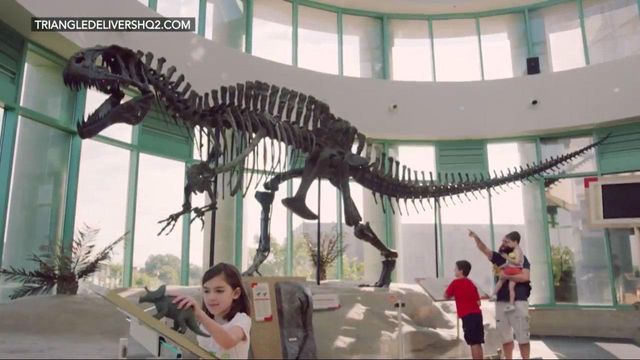Emails shed light on Triangle's potential Amazon HQ2 sites
The massive size requirements of Amazon's sought-after second headquarters eliminated the only potential site in Durham's city limits from consideration for the project, newly released emails show.
Posted — UpdatedFour North Carolina regions – Hickory, Charlotte, the Triad and the Triangle – are among 238 counties and municipalities across the country vying for the online tech giant's new location in proposals submitted last month. The Triangle's bid includes seven sites for the company's consideration, but citing concerns about losing a competitive advantage, officials have so far refused to tell the public where they are.
The GoTriangle transit station along U.S. Highway 15/501 and Interstate 40 was the only option on the list in the city proper, but Amazon's need for 8 million square feet of office space means the location wouldn't be enough for the proposal.
"It does not look like the Go Triangle Transit station on 15-501/I-40 will work, just not enough space can be developed on the site or in the vicinity, so there will not be any city sites," Ted Conner, vice president of the Greater Durham Chamber of Commerce, wrote to colleagues and city officials on Sept. 20. "We looked downtown, around the Imperial Center and we could not find sufficiently large sites."
Geoff Durham, president and chief executive of the Greater Durham Chamber of Commerce, said at least one of the seven sites that made the Triangle's bid to Amazon was in the Durham area.
The final proposed sites are all located in Wake, Durham and Chatham counties, according to RTRP Executive Director Ryan Combs. But Combs stopped short of confirming that Park Center was on the final list in an interview Wednesday morning.
"If you look at Park Center, and what they're trying to do with Park Center, I think it would fit Amazon's needs," Combs said.
Durham City Manager Tom Bonfield said the size of the project means that, even if the new Amazon campus isn't in the city limits, selecting the greater Triangle region would mean a major economic impact.
"If the facility was located in RTP, that would be huge for Durham, even though we weren't getting any property taxes from it," Bonfield said. "It's less about the property taxes as it is the overall economic impact."
Few details on incentives
The emails also show that Durham city and county officials could choose to offer Amazon up to $50 million in incentives over about 24 years, based on the enormous size of the project. Any incentive offer, Bonfield said, would have to be approved by city and county officials and would be based on actual hiring.
Conner said he based that figure on current city and county policies. But because the company hasn't provided a lot of detail yet, the proposal to Amazon doesn't provide a specific dollar figure.
"We didn't have to quantify it because we weren't in a position to quantify it," Conner said in an interview. "We just provided copies of the policies because that was their request."
Rather than focusing on incentives, Combs said the final proposal to Amazon focused on the strengths of the area that sets it apart, including its access to talent and quality of life. Any incentives offer, he said, would depend on the location and what cities, counties and municipalities would be willing to offer.
"Trying to throw incentive numbers at the project without knowing what they're interested in was not the best use of our time," Combs said.
There was, however, discussion in the emails released last week about the potential size of the Durham-area investment. In a response to Conner and others, Director of Durham Economic and Workforce Development Andre Pettigrew said $40 million to $50 million would be a "significant investment."
"There's no other way to describe it," Pettigrew said in an interview Wednesday.
He also sought more information in the email about how unemployed and underemployed communities in Durham would see impacts from the second headquarters project.
"I'm anticipating that a portion of the financial incentives will be sourced from and targeted at workforce job training and development," Pettigrew wrote to Conner and others on Sept. 21. "These are areas of shared interest within our community when it relates to financial incentives."
Pettigrew said in an interview that conversations in a project this large should examine ways to address training gaps.
"It's not simply that a rising tide raises all boats," Pettigrew said. "In my experience, if you have people who don't know how to swim, in a rising tide, they may drown. And if you don't have seaworthy boats, those boats will sink."
Amazon has a history of supporting these types of programs, he said, and it's up to the region to push for them.
"Amazon is an organization that has the capacity to make an impact," he said. "I think they'd be a willing partner."
Any final incentive offer to Amazon would undoubtedly be a mix of funding from cities, counties and the state, which has its own programs to offer multi-million dollar subsidies for "transformative projects." But for Durham's part, Bonfield said whatever city leaders opt to provide will remain based on performance, whether it's actual investment or jobs created.
"I don't anticipate that's going to change at all if Durham is part of the ultimate proposal," Bonfield said. "For that reason, I think taxpayers are protected."
Related Topics
• Credits
Copyright 2024 by Capitol Broadcasting Company. All rights reserved. This material may not be published, broadcast, rewritten or redistributed.






